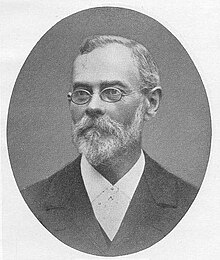Carl Pauli (philologist)
Carl Eugen Pauli (born October 14, 1839 in Barth , † August 7, 1901 in Lugano , Switzerland ) was a German high school teacher , linguist and important researcher of the Etruscan language .
Life
Carl Pauli passed the Abitur in 1858 at the Pädagogium Putbus and studied philology at the universities in Erlangen and Greifswald . There he became a member of the Greifswald fraternity Rugia . From 1861 he was an assistant teacher at the Friedrich Wilhelm School in Stettin and in May 1862 he was awarded a doctorate at the University of Greifswald. phil. PhD with a thesis “About the German verba pre-teritopresentia”.
After the teaching degree (German, Greek, Latin, French, mathematics) at the University of Greifswald in 1863, he continued to work as a teacher at the Friedrich Wilhelm School in Stettin. At Easter 1867 he switched to the higher middle school in Lauenburg / Pomerania and in April 1869 to the higher middle school Hannoversch-Münden . At Easter 1873 he was appointed senior teacher at the Hanover Realschule and in October 1876 rector of the Realgymnasium in Uelzen . He resigned from this office at Easter 1884.
In the summer of 1884 he began his habilitation thesis in Berlin, which he completed in 1885 as a private lecturer in Leipzig. Then in 1886 he was head of a boys' boarding school and teacher at the Teichmann Education Institute in Leipzig. In early 1893 he became a grammar school professor for Latin and Greek at the Lyceum (Liceo) in Lugano in the canton of Ticino , Switzerland. In 1898 he gave up his job because of a heart disease. In 1901 he fell ill with leukemia and pernicious anemia and died shortly afterwards.
Pauli began his Etruscan language studies around 1875, which he consistently continued in Italy on the occasion of four trips to Italy (1885, 1889, 1896, 1898). On behalf of the Prussian Academy of Sciences in Berlin , he published the Corpus Inscriptionum Etruscarum since 1890 . In 1897 he worked on Roscher's Detailed Lexicon of Greek and Roman Mythology .
Carl Pauli is considered to be one of the first to deal with the problem of the classification or family relationships of the Caucasian languages (1886).
Pauli was a member of the “Société de Linguistique” in Paris (1883) and honorary member of the academy “La nuova Fenice” in Orvieto (1889).
family
Carl Pauli had been married to Anna Isecke since September 5, 1870. Their children were: Karl (* 1872), Nanna (1881–1951), head of the Reich midwife, and Paul (* 1883) as well as another son and daughter, who each died shortly after birth. The Reich Health Leader Leonardo Conti (1900–1945) was Pauli's grandson.
Fonts
- History of the Latin verb in uo. Szczecin 1865.
- About the naming of the body parts among the Indo-Europeans. Szczecin 1867.
- The naming of the lions among the Indo-Europeans. Münden 1873.
- Etruscan Studies:
- About the meaning of the Etruscan words etera, lautn'eteri and lautni. 1879.
- About the Etruscan forms arnthial and larthial. 1880.
- The Etruscan formulas of possession, dedication and grave. 1880.
- The lautni and etera question again. 1881.
- The Etruscan numerals. 1882.
- The so-called consecration poem of Corfinium and the language of the Paligna. In: Old Italian Studies. Issue 5, 1887.
- Corpus inscriptionum etruscarum. Leipzig 1893–1902.
- The indigenous people of the Apennine Peninsula. In: Helmolt: World History. Vol. 5, 1900.
- Are the Ligurians Indo-Europeans? In: Supplement to the Allgemeine Zeitung Munich. No. 157, 1900, pp. 1-6.
- The Pelasger question. In: Supplement to the Allgemeine Zeitung Munich. No. 84, April 25, 1901, pp. 1-5.
literature
- Erich Gülzow : Karl Pauli, 1839–1901, linguist. In: Walter Menn: Pomeranian Life Pictures . Volume IV. Cologne 1966, pp. 397-408.
- Gustav Herbig : Karl Pauli. In: Biographical yearbook of ancient studies. 29, 1906, pp. 54-75.
Web links
- Literature about Carl Pauli in the state bibliography MV
- Carl Pauli personnel sheet in the personnel file of the BIL reviewer in the archive database of the Library for Research on Educational History (BBF)
Individual evidence
- ^ Georgij A. Klimov, Jost Gippert: Introduction to Caucasian Linguistics. Buske Verlag, Hamburg 1994, ISBN 3-87548-060-0 , p. 27.
| personal data | |
|---|---|
| SURNAME | Pauli, Carl |
| ALTERNATIVE NAMES | Pauli, Carl Eugen (full name) |
| BRIEF DESCRIPTION | German high school teacher, linguist and researcher of the Etruscan language |
| DATE OF BIRTH | October 14, 1839 |
| PLACE OF BIRTH | Barth |
| DATE OF DEATH | August 7, 1901 |
| Place of death | Lugano , Switzerland |
